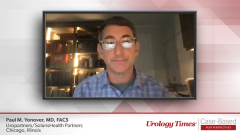
Unmet Needs Surrounding the Treatment of Prostate Cancer
Paul M. Yonover, MD, FACS, offers closing thoughts on unmet needs and clinical challenges surrounding the treatment of prostate cancer.
Episodes in this series

Case #2: A 78-Year-Old Man with Metastatic Prostate Cancer
Initial Presentation
- A 78-year-old cap screening naive man presents with right hip pain and fatigue
Clinical workup
- Abnormal DRE; PSA 140 ng/mL; Hgb 9.9 g/dL
- Biopsy revealed diffuse Grade Group 4 and 5 prostate adenocarcinoma
- Imaging with CT and 99Tc bone scan revealed multiple metastatic bone lesions in the right hip and pelvis in the pelvis, liver lesions c/w mets, and a few scattered LN
Diagnosis
- Patient is diagnosed with de novo metastatic prostate cancer (de novo M1CSPC)
- Germline and somatic genetic testing are negative
This is a synopsis of a Case-Based Peer Perspectives series featuring Paul M. Yonover, MD, FACS, of Uropartners/SolarisHealth Partners.
Dr. Paul Yonover discussed some of the current limitations and barriers in optimal management of high risk prostate cancer patients, focusing on three key areas - use of molecular imaging, germline genetic testing, and clinical trial enrollment.
He described significant heterogeneity across different health systems and regions in utilization of molecular imaging like PSMA-PET scanning despite great potential to impact decision making. Major barriers are access and availability, radiology expertise in scan interpretation, and variable insurance coverage. Similarly, adoption of germline mutation testing remains low among urologists who serve as gatekeepers for prostate cancer diagnosis and treatment. There are educational, financial, and system barriers regarding access to genetic counselors. He believes comprehensively leveraging germline and tumor genomic profiling is fundamental for the era of precision medicine.
Unfortunately, precision medicine approaches feel spotty in implementation, as does enrollment of ideal patients onto clinical trials. He described this treatment-naïve patient with high-risk metastatic prostate cancer as an archetypical patient needed to advance prostate cancer therapies within trials. But barriers exist towards optimal utilization of emerging advanced diagnostic tests, precision medicine platforms, and clinical trial participation. He argued the urologic community must work to address these limitations to best serve patients and progress treatment paradigms.
*Video synopsis is AI-generated and reviewed by Urology Times editorial staff.
Newsletter
Stay current with the latest urology news and practice-changing insights — sign up now for the essential updates every urologist needs.







